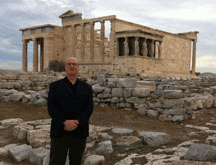
By Jim Hackney,
Managing Partner
I had the tremendous honor of being invited by the U.S. State Department to travel to Greece on their behalf as an Arts Envoy. My mission, this past November, was to meet with and train staff members at several museums and science centers. The subject of my work was seemingly simple: How to start a basic fundraising program.
In both Thessaloniki in the north and Athens in the south, people were eager to absorb our philosophy and learn how to increase private financial resources. Most cultural organizations in Greece are government funded. However, with that country’s current financial crisis, budgets have been cut between 40 and 68 percent, sometimes overnight.
To get things started, I led the workshop Inviting Philanthropy, which set up a week of intense, if not primary, fundraising work. In the Greek culture “philanthropy” is a word used only for social service needs; not cultural or educational institutions. We had our work cut out for us!
Somewhere along the way, during my 32 years working in development, I knew that “philanthropy” was a Greek-based word that meant, “love of humankind.” I now found myself having to change the way this ancient culture not only looked at philanthropy, but I also had to teach them how to apply it outside the box. After discussions with several museum directors, it was clear that philanthropy was the right word for what cultural organizations in Greece were tasked to undertake.
The challenge now is that Greek donors, and cultural workers, will have to learn to expand the definition of philanthropy. And even more importantly, these once government-funded institutions will have to learn how to raise philanthropic “private” dollars…which is something they have not needed until now.
When I returned home, I read a significant study released by CompassPoint that reports that nonprofits of all types in the United States are in real danger because of the continuing decline of philanthropic dollars. The study interviewed volunteers, development officers and executive directors, and confirms what many of us (and you) have known for years:
- There are unrealistic fundraising demands placed on development staff members.
- Board members and Executive Directors must be involved in a “culture” of philanthropy if a nonprofit is going to succeed.
- You can’t just hire staff and expect that your fundraising needs will be taken care of.
There are many other important gems to be mined from this report.
Just as Greek cultural organizations are starting to learn how to raise private dollars, we have a lot of work to do to continue to build our own development structures at home. This trip to Greece reminded me, once again, that we have to take care of our staff, nurture our relationships with supporters, and invite new individuals to join with us in support of our cultural organizations. How does your museum stack up?



